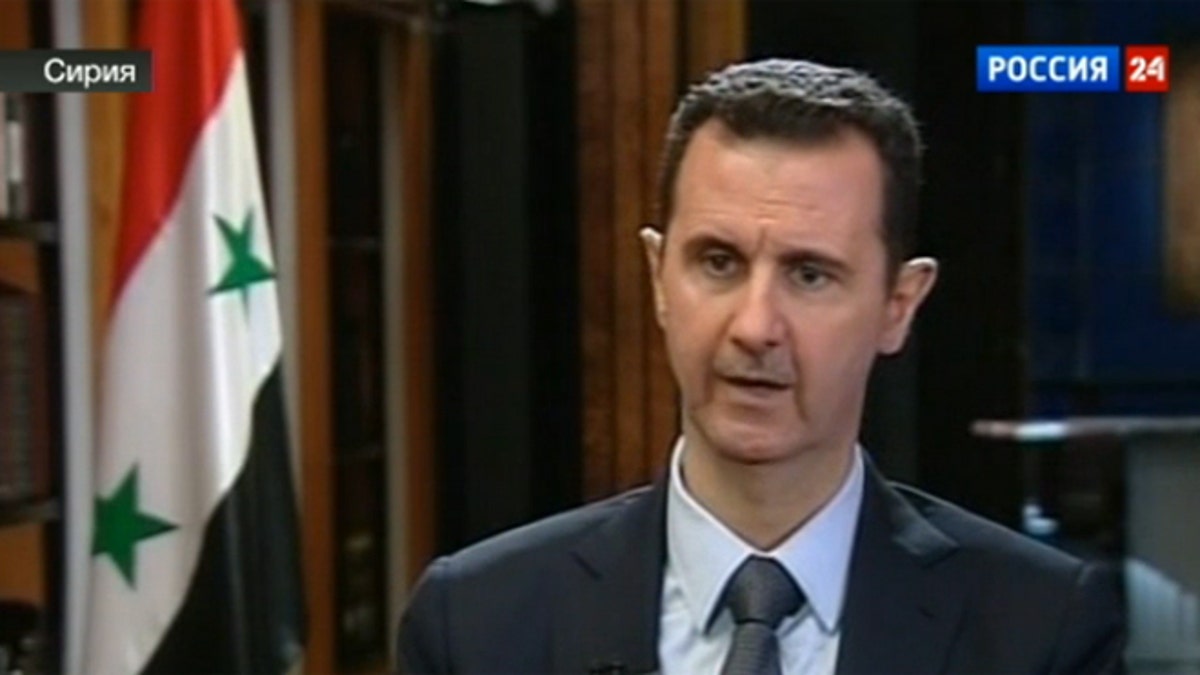
Syrian President Bashar Assad speaks with Russia's Rossiya 24 news channel. (Rossiya 24)
Bashar Assad joined Vladimir Putin on Thursday in pressuring the Obama administration to abandon military threats against Syria, suggesting an emerging plan to have the Assad regime turn over its chemical weapons could only proceed if the U.S. backs down.
The Assad-Putin tag-team is increasingly worrying lawmakers on Capitol Hill -- at least those who had come out in favor of military action against Assad as punishment for using chemical weapons.
House Speaker John Boehner said Thursday he was "insulted" by an op-ed Putin penned in The New York Times urging President Obama to back off the threat of strikes and telling Americans they are not "exceptional."
Putin was joined Thursday by Assad, who on Russian television gave his first interview since the Russia-backed plan to have Syria turn over its weapons was announced. He said his government will start submitting data on its chemical weapons stockpile a month after signing the convention banning such weapons, but that the U.S. needs to halt the threats.
"This is a two-sided process and we are counting, first of all, on the United States (to) stop conducting the policy of threats regarding Syria," he said.
Assad claimed that his government only agreed to start turning over weapons "in response to Russia's request and not because of American threats."
Syria's Deputy Prime Minister Qadri Jamil also suggested on Thursday that the Russian proposal will succeed only if the United States and its allies pledge not to attack Syria in the future.
"We want a pledge that neither it (the U.S.) nor anyone else will launch an aggression against Syria," Jamil told The Associated Press in Damascus.
Secretary of State John Kerry, though, said Thursday that the threat of military action is critical to keep the pressure on Assad. In Geneva for talks with his Russian counterpart, he reiterated that Assad is only at the negotiating table because of those threats.
"This is not a game," Kerry said. "(A plan to turn over weapons) has to be real. It has to be comprehensive. It has to be verifiable. ... There ought to be consequences if it doesn't take place."
He also objected to Syria's request to wait a month before submitting data on its stockpile. Syria's U.N. ambassador, Bashar Ja'afari, claimed Thursday that they are now a full member of the Chemical Weapons Convention -- though U.S. officials expect to see much more from Syria, since membership is no guarantee of compliance.
Speaking at a summit of an international security grouping dominated by Russia and China on Friday, Putin said Syria's move to join the arms control agreement showed that the country has "serious intentions to follow this path."
"I would like to voice hope that this will mark a serious step toward the settlement of the Syrian crisis," Putin said.
White House Press Secretary Jay Carney also responded Thursday to Putin's claim that the U.S. is not "exceptional."
"There's a great irony in the placement of an op-ed like this because it reflects the truly exceptional tradition in this country of freedom of expression and that is not a tradition in Russia by Russia," he said.
The Obama administration has taken the view that the proposal is now owned by the Russians, and that Putin is the one whose credibility is on the line. A senior Obama administration official said in response to Putin's op-ed that "the world will note" whether Russia follows through on its commitment to disarm Assad of chemical weapons.
Yet Obama also very publicly stepped away from the brink of military action to give the diplomatic route a chance to play out. Obama had been expected to use a national address on Tuesday to urge Congress to authorize the use of force. He instead made the case that, while military force may be necessary, he wants Congress to postpone a vote while the Russia-backed plan is considered.
In Geneva, Kerry and a team of U.S. experts will have at least two days of meetings with their Russian counterparts.
U.S. officials hope to emerge with an outline of how some 1,000 tons of chemical weapons stocks and precursor materials, as well as potential delivery systems, can be safely inventoried and isolated under international control in an active war zone and then destroyed.
The Associated Press contributed to this report.




